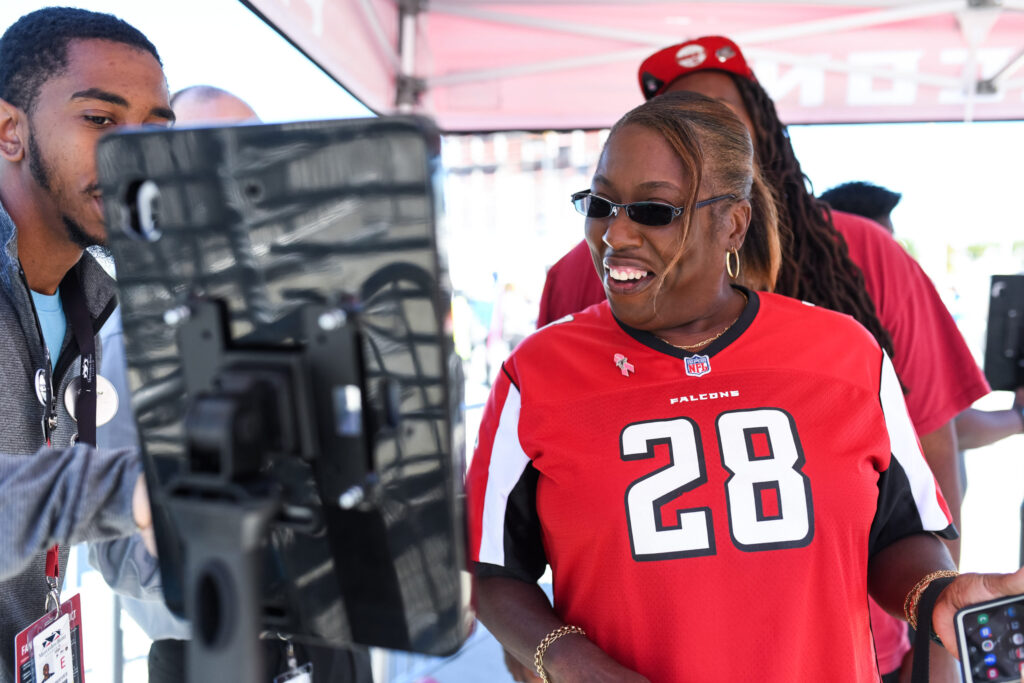
With its futuristic design, its telescoping roof and its first-of-the-kind circular video board, Mercedes-Benz Stadium in Atlanta was the state of the art for stadium technology when it opened in 2017. Seven years later, the venue is still keeping pace, adding and improving its fan-facing technologies to ensure that customers attending its multiple big-time events are getting the best of their event-day experience.
Our guest today on the Stadium Tech Report podcast is Karl Pierburg, senior vice president and chief technology officer for the Atlanta Falcons, who will bring us up to date on the latest tech deployments at Mercedes-Benz Stadium, including a big bet on biometrics, and why keeping at the forefront is critical for a good fan experience. Only on the Stadium Tech Report podcast!
With its futuristic design, its telescoping roof and its first-of-the-kind circular video board, Mercedes-Benz Stadium in Atlanta was the state of the art for stadium technology when it opened in 2017. Seven years later, the venue is still keeping pace, adding and improving its fan-facing technologies to ensure that customers attending its multiple big-time events are getting the best of their event-day experience.
Our guest on the Stadium Tech Report podcast is Karl Pierburg, senior vice president and chief technology officer for the Atlanta Falcons, who will bring us up to date on the latest tech deployments at Mercedes-Benz Stadium, including a big bet on biometrics, and why keeping at the forefront is critical for a good fan experience. Only on the Stadium Tech Report podcast!
The busiest major event stadium in the world?
Before we got to asking Karl any questions about technology, we did ask him to talk a bit about the challenge of just keeping Mercedes-Benz Stadium running, with all the major events the building hosts — from Atlanta Falcons and Atlanta United FC games to many major SEC college football games alongside all the major entertainment acts that visit.
“We consider ourselves the busiest major event stadium in the world,” Pierburg said, estimating that some 3 million guests per year attend events at Mercedes-Benz Stadium. With only a fraction of those being repeat guests like season ticket holders for the Falcons or United, Pierburg said the ongoing challenge for the less-frequent visitors is to “really to convert them into fans of MBS and get them back in the stadium and really make a great impression on them. That’s a ton of fun.”
One of the main ways Mercedes-Benz Stadium creates a positive fan experience is through technology, which Pierburg said is never deployed just because it’s cool.
“Tech for tech’s sake isn’t something we do,” Pierburg said. “Everything that we put in place is really there to do one thing and that’s to take care of the fans that come to our stadium.”
Greeted at the door by new technology
For our discussion, I asked Pierburg to track the stadium technology as a fan would encounter it on a visit to a game or a concert. As part of the team’s desire to “welcome” fans to the venue, Pierburg said the Falcons took an early and focused look at two of the main entry friction points, security scanning and ticket verification.
“We really want to create that experience where coming to our stadium is just like going to your friend’s house to to watch a game,” Pierburg said. “Security was one of the ones that we said, hey, this is a spot where we can really implement technology and process and create a much better fan experience while creating an overall safer venue and also kind of achieving a couple of other organizational goals.”
Even before the Covid pandemic hit, Pierburg said the Falcons were talking to walk-through security scanning manufacturer Evolv, while also bringing in executives from the team security and fan experience departments, as well as the local police and the Georgia Bureau of Investigations to the discussion.
Subscribe to the Stadium Tech Report podcast on iTunes!
“We were just making sure that if we’re touching something as sensitive as security, we’re doing our homework and we’re bringing people in and we’re getting thoughts from everybody involved,” Pierburg said.
After conducting some small trials of the Evolv technology at some premium seating gates, Pierburg said the Falcons were able to reduce the “touch” rate for security scanning — where they would have to stop a fan during entry to check an item or a scan warning — from approximately 90 percent (using legacy magnetometers) to 12 percent using the Evolv systems.
With some fine tuning, the Falcons have now rolled out the Evolv systems stadium-wide, where Pierburg said fans “Don’t take anything out of their pockets, and they don’t have to break stride. And it’s been great.”
Facial authentication helps speed ticketing and concessions
One thing that many stadiums have learned after deploying Evolv systems for security is that while they might have eliminated one bottleneck, they could also be creating another one if the venue positioned security before ticket verification.
“We definitely had a pretty good idea that once we kind of opened up the aperture on security, we were going to get slammed at the turnstiles,” Pierburg said. “So we took a kind of holistic look at how do we help people get through the ticketing now more efficiently?”
Part of that process involved making sure that the entry turnstiles could accept ticket verification from all the major systems, including NFC (near-field communications), Apple Wallet and Google Wallet, Pierburg said. The team also did what it could to ensure that fans were educated to download their tickets before entry so they could be ready for the verification process.
And then as another step, the Falcons were one of the first large venues to test facial authentication ticketing technology from a startup called Wicket. A quick explanation of how the Wicket system works is: At a stadium, fans must pre-enroll in a team ticketing program where they link their face (via a selfie) to their ticketing account. Then at the venue, registered fans use a special entry lane where they face up to a tablet computer, which quickly recognizes them and authorizes all the tickets that person has purchased. Most stadiums that have implemented such systems say that the process is generally much faster than hand-held or podium-based ticket scanning systems.

With the Wicket system, Pierburg said, “you basically walk up to an iPad. The iPad greets you. It says, hey, Karl, thanks for coming. You have four tickets. Do you want to use them all? Yes. And you and all three of your guests just walk into the stadium.” That type of interaction, Pierburg said, seemed like it would appeal to a large segment of the team’s fan base, so the Falcons started testing it in different situations.
“To provide a great experience to our guests, that technology had to work, and it had to work correctly,” Pierburg said. “It couldn’t have a bias about not recognizing any one demographic, age, race, or gender. So we did a lot of pilots, did a lot of testing in low light, high light, we brought some twins in, had people with masks on — we had a lot of fun trying to fake it out and trick it.”
Pierburg said the team continually tested and worked closely with Wicket over a couple years to really figure out the best ways to implement the system, to combine the technology with security and how the gates for both should be placed for optimum flow. While Pierburg said the team will never force fans to use biometric systems for entry, they are currently seeing about an 8 percent take rate at games for the Wicket ticketing process, almost to the team’s goal of 10 percent.
While the multiple entries to Mercedes-Benz Stadium mean that the venue doesn’t see the backup that other stadiums might, Pierburg said approximately 40 percent of the season ticket holders have at least enrolled in the system. It’s all part of ensuring a better fan experience, Pierburg said.
“We tried to do a great job holistically around the building and making sure that however you enter, we get you in fast,” Pierburg said. “And this is just one of those means.”
Helping fans get food and drink faster
Once inside the stadium, fans at Mercedes-Benz Stadium are also greeted by technology designed to get them food and drink in a faster manner. One way is by the several checkout-free stands the Falcons have deployed, using technology from checkout-free startup AiFi. At those stands, fan scan a payment system at entry, grab the items they want and leave, with payment taking place later online.
The Falcons are also testing technology from a company called Spirited which provides self-service cocktail machines that also use facial authentication systems (which verify age as well as payment) to speed up transactions. While recognizing that not all fans will want to jump through some hoops for concessions transactions, Pierburg said that by putting in some forward-looking systems, the team allows all fans to benefit from shorter wait times that result from dispersing fans to the different stands.
“We say if you’re not comfortable with [new technology], don’t use it. We’ve got a ton of different ways for you to get what you want. We’re just trying to to provide choices, and some of those choices will take the pressure off of the other areas for people that aren’t comfortable doing that.”
Finding more ways to keep fans happy
Even though the Falcons and Mercedes-Benz Stadium are among the leaders in use of venue technology, Pierburg said the focus on the fan experience keeps the team looking for more ways to use technology to improve a visit to their house.
“The event you came here to do, be it a Falcons game, a Atlanta United game, a concert, college football, whatever it is, you’re coming for that,” Pierburg said. “You’re really not coming to park. You’re not coming to wait in line. You want food, but you don’t want to start waiting for it. Our job is to kind of make sure we’ve cataloged those pain points, identified those, and then we find ways to research what are the ones that are really keeping our fans from enjoying this experience, and then see if there’s something we can do there.”
MORE STR PODCASTS
STR Podcast: Amazon’s Jon Jenkins discusses stadium strategies, successes for ‘Just Walk Out’ stores
STR Podcast: Oak View Group CTO Katee LaPoff discusses tech strategy from a multi-venue perspective
STR Podcast: Aramark’s Alicia Woznicki talks about the tech revolution in concessions
STR Podcast: Zippin CEO Krishna Motukuri touts the power of checkout-free technology


